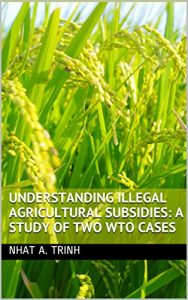The Agreement on Agriculture (AoA) is one of the two main agreements in the Uruguay Round Agreements that introduces the specific regulations in the liberalisation of agricultural products. The other one is the Agreement on Textiles. As in all the other multilateral trade agreements that came into effect in 1995, the AoA is compelling all members of the World Trade Organization (WTO).
Based on its professed purpose of setting up a fair and market-oriented trading system in agriculture, the AoA requires member nations to encourage market access and subordinate trade-distorting agricultural subsidies.
However, as the paper will discuss below, the agriculture agreement itself is highly unfair. Instead of evening the playing field in international trade in agriculture, it emphasises the monopoly control of wealthier countries and their multinational enterprises in global agriculture production and trade. There are plus points as well as unsolved inadequacies from both developed countries (i.e., US and EU) and emerging countries sides regarding agricultural subsidies. This research paper will reflect the above view based on the two typical WTO cases about agricultural subsidies:
1. BRAZIL’S COTTON SUBSIDIES CASE AGAINST THE UNITED STATES
2. CASE AGAINST THE EU FOR SUGAR SUBSIDIES AND DUMPING
Based on its professed purpose of setting up a fair and market-oriented trading system in agriculture, the AoA requires member nations to encourage market access and subordinate trade-distorting agricultural subsidies.
However, as the paper will discuss below, the agriculture agreement itself is highly unfair. Instead of evening the playing field in international trade in agriculture, it emphasises the monopoly control of wealthier countries and their multinational enterprises in global agriculture production and trade. There are plus points as well as unsolved inadequacies from both developed countries (i.e., US and EU) and emerging countries sides regarding agricultural subsidies. This research paper will reflect the above view based on the two typical WTO cases about agricultural subsidies:
1. BRAZIL’S COTTON SUBSIDIES CASE AGAINST THE UNITED STATES
2. CASE AGAINST THE EU FOR SUGAR SUBSIDIES AND DUMPING












